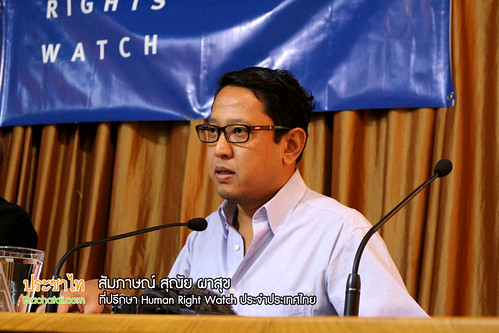The release of Cambodian political fugitive Sam Serey early on Friday morning earned the praise of the international community while stoking tensions with Cambodian officials. But a researcher at Human Rights Watch is doubtful that his release indicates a broader change in the way Thailand treats refugees and asylum seekers.
Thailand released Sam Serey on 27 April to be flown back to Denmark, where he has permanent resident status. Serey was arrested last Wednesday for overstaying his visa. Cambodia submitted a formal request for his extradition on Thursday.
Sam Serey (Photo from YouTube)
His release stands in contrast to the recent
case of Sam Sokha, a female Cambodian labour activist who fled Cambodia after she faced charges for throwing a shoe at a billboard belonging to the ruling party. She was hastily extradited to Cambodia to face a prison sentence, despite being recognised by the UN as a refugee.
That decision violated the principle of non-refoulement under customary international law, which prohibits states from returning individuals back to countries where they might face human rights violations.
In recent years Thailand has extradited refugees and asylum seekers at the request of foreign governments including Turkey, China and Cambodia, many of whom were recognised by the UNHCR as refugees and risked torture and other human rights violations in their home countries.
Thailand has not ratified the international convention on refugees, meaning that — aside from those living in designated camps on the border with Myanmar — any refugee is treated as an undocumented immigrant. Without legal recognition as refugees, they are subject to arrest and deportation.
“Thailand was once known as a country that has compassion and mercy, that gives protection and care to those who flee persecution,” says Sunai Phasuk, a senior researcher on Thailand for Human Rights Watch.
“By working together with those regimes in arresting and handing over people who flee prosecution...there’s nothing to describe this but under military rule Thailand has become a rogue state with regard to [its] obligation to protect refugees and asylum seekers.”
Sunai says that the difference in Serey’s case was the “forceful and vocal intervention” from the international community, and Serey’s permanent resident status in Denmark.
He is doubtful whether this will set a precedent for other activists and dissidents who might not have a third-country alternative, or even valid travel documents.
“If the Thai government arrests them and receives requests for extradition from their home governments there is only one option, that is for them to be sent back,” he said.
Deputy Prime Minister and Defence Minister Prawit Wongsuwan was visiting the United States during the time that Serey was arrested, raising speculation that his absence was the reason Serey was released.
But Sunai was skeptical. “In today’s world a decision can be made from anywhere,” he said. “If he decided to go ahead with extradition no one would dare to get in his way.”
Cambodian officials were quick to express their dismay.
“We have an extradition agreement with them. Why did they do that to us? We are really disappointed,” a Cambodian Interior Ministry spokesperson told the
Phnom Penh Post.
He warned that Cambodia might ignore Thai requests for extradition in the future. “This time it is your turn, and next time it’s our turn,” he said. “We are the neighbouring countries. We did not ask you for basil and lemongrass. We asked you for the prisoner.”
Serey has long been sought after by Cambodian authorities for operating the dissident Khmer National Liberation Front, deemed a terrorist organisation by the government. Serey has been accused of various violent plots, but with little evidence.
He received political asylum in Denmark but was sentenced in absentia to nine years in prison for allegedly plotting an attack.
Serey told the Phnom Penh Post on Sunday that when he went to renew his already-expired visa he was detained by immigration police before being transferred to the Immigration Detention Centre (IDC).
On his way to the IDC he sent messages to the UN, Human Rights Watch, and the Danish Embassy. “I knew there would be intervention,” he said.
He was released after four hours in detention and told to buy a flight to Copenhagen immediately. He is now banned from entering Thailand for five years.
Sunai said that if there is anything to be learned from this case it is the necessity for a strong and concerted intervention from the international and diplomatic community, one that he felt was “too late” in the case of Sam Sokha.
“This is a good learning process and we hope that it will set a new precedent,” he said. “No delay, no fussing around, but everybody speaks in one voice that refoulement is unacceptable and there could be consequences if Thailand decides to go ahead with blatant violations of international laws, blatant violations of [its] human rights obligations.”
sequences if Thailand decides to go ahead with blatant violations of international laws, blatant violations of human rights obligations.”
Sunai Phasuk




